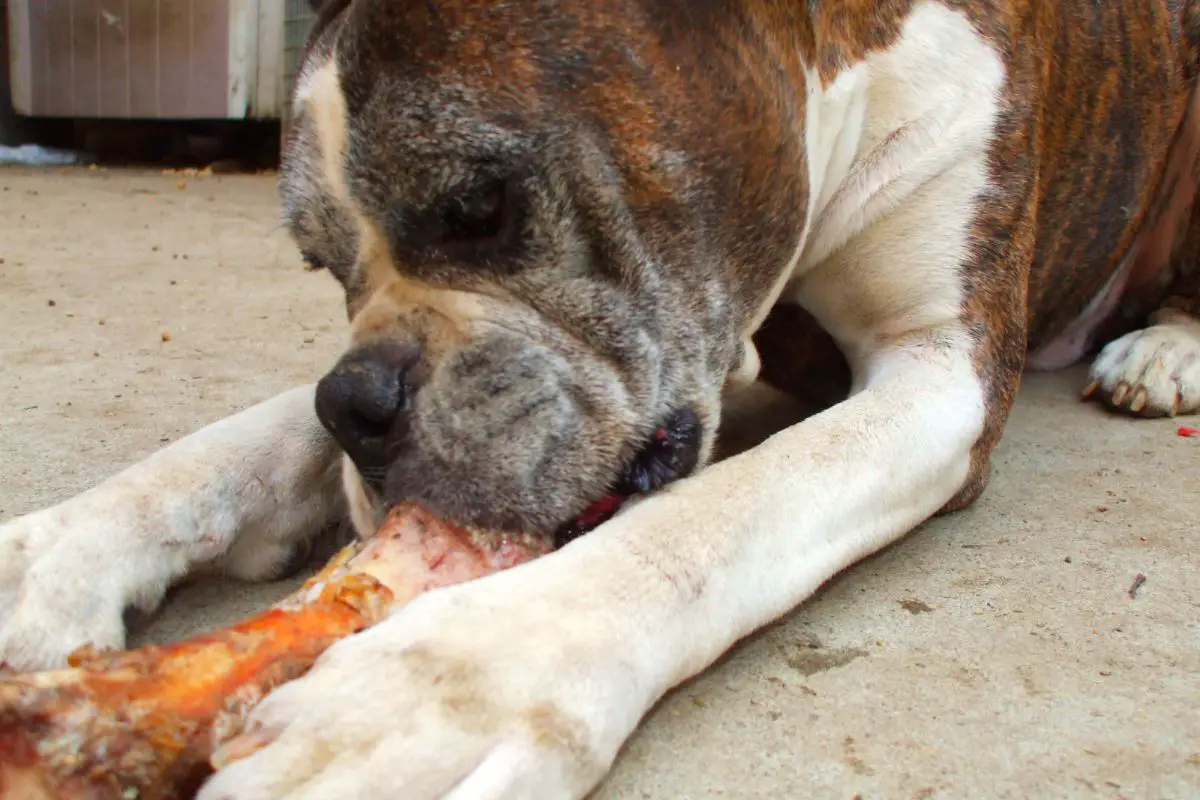This post contains affiliate links.
We love our pets and are often tempted to share all the foods we enjoy with them. If you like to cook with delicious fresh basil, you may be wondering if this is a safe food to share with your pet dog. There are many herbs that dogs can also enjoy the benefits of, and luckily basil is one of them.
Dogs can eat basil in moderation. It’s not poisonous to them, so you don’t need to worry if they consume it by accident. You can even intentionally add this special herb to your dog’s diet so they can enjoy its health benefits such as anti-inflammation, relaxing, and cancer-fighting effects.
In the rest of this article, we’ll explore the health benefits basil can provide to you and your pup. You’ll also see how you can feed it to your dog. Finally, we’ll have a quick overview of hazardous herbs to your dog’s health so you can make choices for their diet.
Table of Contents
Why Your Dog Might Eat Basil
Basil is a commonly used ingredient in many dishes, but rest assured that you don’t need to worry if your dog accidentally eats something that contains basil. This herb is not poisonous to dogs. Instead, it has a wide range of health benefits that humans and dogs alike can experience when consuming this super herb.
If you’re not familiar with basil, it’s a versatile herb found in many human foods. Its fresh green leaves can be used to garnish a pizza or ground up to make a tasty pesto. It’s an ingredient of many Italian dishes as well as many Thai cuisine classics.
Plus, many home gardeners enjoy keeping a basil plant as this herb can be easy to grow. So, your furry friend may feed on the herb while wandering around the yard.
It doesn’t make a difference for dogs if they consume a fresh basil leaf or food that contains the dried herb; it’s not poisonous to them in any of its forms. However, dishes that call for basil also use garlic, a food that can be dangerous to dogs. So, it’s important to know what is inside the dishes your dog may come into contact with.
Basil Health Benefits for Dogs
Basil is a highly beneficial herb for humans, and luckily dogs can enjoy many of the same health benefits without major health risks. However, for both humans and dogs, fresh basil is more nutritious, while dried and crushed basil can lose its health-enhancing properties. If you’re looking for the maximum health impact, choose fresh basil for you and your dog.
Here are a few benefits of basil for your pet:
High Levels of Antioxidants
Basil contains high levels of antioxidants. Although basil has many different varieties, they all contain compounds that contribute to a high antioxidant count. Antioxidants are important because they fight free radicals in the body. These free radicals, if left unchecked, can go on to cause serious health problems.
Cell damage and ultimately cancer can be the result of too many free radicals in the body. By consuming superfoods with plenty of antioxidants, both you and your dog are able to optimize your body to stay healthy. Moreover, consuming basil and other superfoods on a regular basis can be a delicious and smart way to give the body the preventative care it needs.
Powerful Essential Oils
Another common compound found in many varieties of basil is essential oils. Many kinds of basil naturally contain high levels of eugenol, linalool, and citronellol. These essential oils are important because they can reduce inflammation in the body. This benefit is true for dogs as well as humans.
If your dog is beginning to suffer from some mild arthritis or other disease involving inflammation, basil can be a natural healing option. While it’s important to always follow a veterinarian’s advice, basil can be a first step before relying on medicine for inflammation management.
Like with humans, inflammation can occur in part from an unhealthy diet. However, upon your veterinarian’s confirmation, eliminating any inflammatory foods, and adding basil to your dog’s diet, may improve your dog’s health naturally.
Adaptogen for Stress and Anxiety
Tulsi basil, also known as holy basil, is a special strain of basil particularly helpful for mental health. This variety is still safe for dogs and is widely used in Ayurvedic medicine as a way to ease stress responses, anxiety, and depression.
This kind of basil is known as an adaptogen. If you’re unfamiliar with this term, adaptogens are a kind of naturally occurring supplement that will adapt to stressors you’re experiencing and contribute to better mental balance.
For dogs that suffer from nervous and anxious states, tulsi basil can be a natural way to help them cope with the stresses in their lives.
How To Feed Your Dog Basil
Your dog may or may not be interested in gobbling up a fresh basil leaf from your garden. So, here are a few tricks to try:
- If they’re not interested in eating fresh basil on their own, you can slice it up and add it as a garnish to his dog food.
- If you enjoy cooking pesto, you can make a special dog-friendly version that doesn’t contain garlic or any other dangerous substances for dogs.
- You can also add some basil to your homemade dog biscuits and bake it in.
As with any new food, you’ll want to introduce basil slowly to your dog’s diet and watch for any side effects. Although this herb isn’t toxic to dogs, you’ll want to feed it in moderation. Consuming any food in excess can cause problems. Additionally, you’ll want to ensure your dog doesn’t have any adverse allergic reactions to this new tasty herb.
Herb Overview for Dog Owners
If this article has got you wondering what other herbs you can share with your dog, I’ll provide a quick overview. There are many herbs that your dog can enjoy, but some are also dangerous and should be avoided.
Some common herbs that are safe for dogs include:
- Basil is safe for your dog in all of its varieties.
- Cilantro is another tasty topping that’s not poisonous for dogs.
- Dill is another herb that’s safe for your pup, meaning they can enjoy a dill pickle from time to time.
- Mint is generally safe for dogs in small quantities. But one type of mint plant, known as the Pennyroyal, doesn’t fall into this category. So, make sure you know what kind of mint you’re growing or sharing with your pet.
However, not all herbs are safe for pets. These should be avoided:
- Lemongrass is an ingredient that your dog should avoid. Although it’s not severely toxic, it’ll likely lead to stomach aches and discomfort in digestion.
- Chamomile may be a favorite tea for humans, but it’s a no-no when it comes to pets.
Tips for Supplementing Your Dog’s Diet
Remember while some human foods can be beneficial for your pet, it is important to do your research and proceed carefully when it comes to integrating new items into your pet’s daily meals. If you are feeding your dog a steady diet of commercially purchased dry dog food, you can consider adding supplements like basil to their diets. These foods are safe for dogs, beneficial for their health and can be given in moderation.
Superfoods
If you are looking for superfoods that are safe for dogs, you may consider feeding them eggs, wheatgrass, sprouts or pomegranate. These are superfoods for humans as well, so if you can eat them as well.
Final Thoughts
When it comes to giving your pet a better diet, basil is a great choice because tt’s safe for dogs and doesn’t have any substantial side effects or risks. The special herb can improve your dog’s health and can be fed in a variety of ways. Whether your dog enjoys a fresh basil leaf from time to time or enjoys it baked into some homemade biscuits, you can rest assured that sharing basil with your dog is a safe and healthy choice.
Related Articles
- Can Dogs Eat Bell Peppers? We Asked the Experts
- Can Dogs Eat Black Licorice? Read This First!
- Can Dogs Eat Black Pepper? Here’s What the Expert Says
- Can Dogs Eat Brie? (We Asked the Experts)
- Can Dogs Eat Chicken Nuggets? Yay or Nay
Sources
- Dog Food Genius: Can Dogs Eat Basil?
- Healthline: Holy Basil: Benefits for Your Brain and Your Body
- Homes Alive Pet: 50 Dangerous Garden Plants for Dogs
- Nourish by WebMD: Health Benefits of Basil
- Rover: Can My Dog Eat Basil?
- Spoiled Hound: Can Dogs Eat Herbs? What to Know About Dogs and Herbs
Mrdogfood.com is a participant in the Amazon Services LLC Associates Program, an affiliate advertising program designed to provide a means for sites to earn advertising fees by advertising and linking to Amazon.com. We also participate in other affiliate programs which compensate us for referring traffic.




